小学英语重难点知识大汇总
英语新课标小学重难点
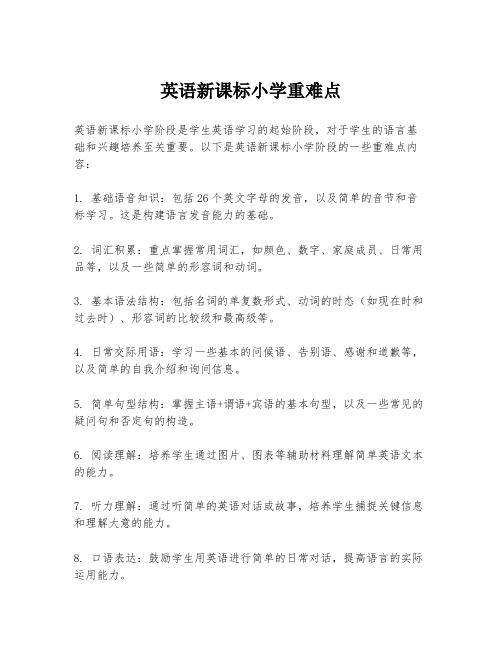
英语新课标小学重难点英语新课标小学阶段是学生英语学习的起始阶段,对于学生的语言基础和兴趣培养至关重要。
以下是英语新课标小学阶段的一些重难点内容:1. 基础语音知识:包括26个英文字母的发音,以及简单的音节和音标学习。
这是构建语言发音能力的基础。
2. 词汇积累:重点掌握常用词汇,如颜色、数字、家庭成员、日常用品等,以及一些简单的形容词和动词。
3. 基本语法结构:包括名词的单复数形式、动词的时态(如现在时和过去时)、形容词的比较级和最高级等。
4. 日常交际用语:学习一些基本的问候语、告别语、感谢和道歉等,以及简单的自我介绍和询问信息。
5. 简单句型结构:掌握主语+谓语+宾语的基本句型,以及一些常见的疑问句和否定句的构造。
6. 阅读理解:培养学生通过图片、图表等辅助材料理解简单英语文本的能力。
7. 听力理解:通过听简单的英语对话或故事,培养学生捕捉关键信息和理解大意的能力。
8. 口语表达:鼓励学生用英语进行简单的日常对话,提高语言的实际运用能力。
9. 书写技能:学习书写英文字母和单词,注意字母的大小写和单词的拼写。
10. 跨文化交际意识:通过学习英语,了解不同文化背景下的交流方式和礼仪。
11. 学习策略:教授学生如何有效地记忆单词、如何使用词典等学习工具,以及如何自我监控学习进度。
12. 情感态度与价值观:培养学生对英语学习的兴趣和自信心,以及尊重不同文化的态度。
在教学过程中,教师应结合学生的实际情况,采用多样化的教学方法,如游戏、歌曲、角色扮演等,以提高学生的学习兴趣和参与度。
同时,注重培养学生的自主学习能力和批判性思维,为他们的终身学习打下坚实的基础。
六年级上册英语重难点
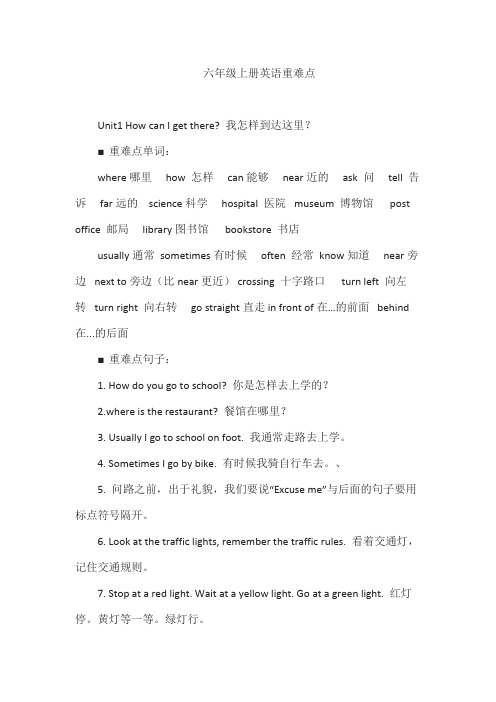
六年级上册英语重难点Unit1 How can I get there? 我怎样到达这里?■重难点单词:where哪里how 怎样can能够near近的ask 问tell 告诉far远的 science科学hospital 医院 museum 博物馆 post office 邮局library图书馆 bookstore 书店usually通常sometimes有时候often 经常know知道near旁边 next to旁边(比near更近) crossing 十字路口 turn left 向左转 turn right 向右转go straight直走 in front of在…的前面 behind 在...的后面■重难点句子:1. How do you go to school? 你是怎样去上学的?2.where is the restaurant? 餐馆在哪里?3. Usually I go to school on foot. 我通常走路去上学。
4. Sometimes I go by bike. 有时候我骑自行车去。
、5. 问路之前,出于礼貌,我们要说“Excuse me”与后面的句子要用标点符号隔开。
6. Look at the traffic lights, remember the traffic rules. 看着交通灯,记住交通规则。
7. Stop at a red light. Wait at a yellow light. Go at a green light. 红灯停。
黄灯等一等。
绿灯行。
8. Red means stop, yellow means wait, green means go. 红色的意思是停止,黄色的意思是等待,绿色的意思是通行。
9. How can I get to the park? 我该怎样到达公园呢?10. You can go by the No. 15 bus. 你可以坐15路公交车去。
人教版小学英语重难点
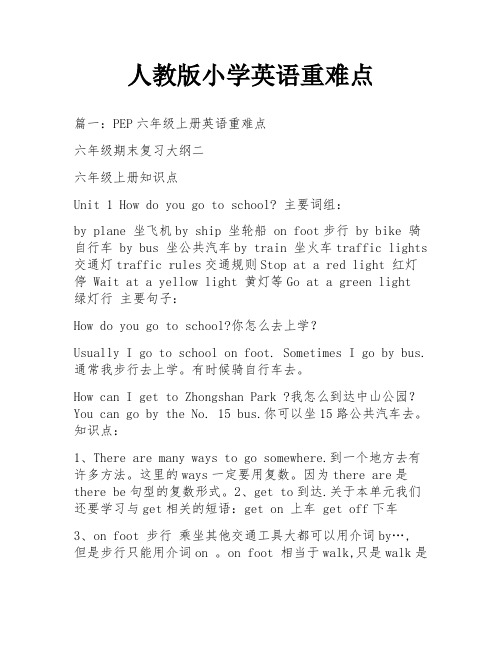
人教版小学英语重难点篇一:PEP六年级上册英语重难点六年级期末复习大纲二六年级上册知识点Unit 1 How do you go to school? 主要词组:by plane 坐飞机by ship 坐轮船 on foot步行 by bike 骑自行车 by bus 坐公共汽车by train 坐火车traffic lights 交通灯traffic rules交通规则Stop at a red light 红灯停 Wait at a yellow light 黄灯等Go at a green light 绿灯行主要句子:How do you go to school?你怎么去上学?Usually I go to school on foot. Sometimes I go by bus.通常我步行去上学。
有时候骑自行车去。
How can I get to Zhongshan Park ?我怎么到达中山公园?You can go by the No. 15 bus.你可以坐15路公共汽车去。
知识点:1、There are many ways to go somewhere.到一个地方去有许多方法。
这里的ways一定要用复数。
因为there are是there be句型的复数形式。
2、get to到达.关于本单元我们还要学习与get相关的短语:get on 上车 get off下车3、on foot 步行乘坐其他交通工具大都可以用介词by…, 但是步行只能用介词on 。
on foot 相当于walk,只是walk是动词。
by subway 和by train,注意区别。
by subway: 地铁,是有墙壁的。
by train: 火车,露天的。
4、go to school的前面绝对不能加the,这里是固定搭配。
但是go home回家,home前不加to。
5、USA 和 US 都是美国的意思。
另外America也是美国的意思。
小学英语基础知识+重点难点分析详解

第一部分:基础知识1.字母:26个字母的大小写ABCDEFGHIJKLMNOPQRSTUVWXYZabcdefghijklmnopqrstuvwxyz2.语音:元音的发音五个元音字母:AEIOU12个单元音:前元音:[i:] [ɪ] /e/ [æ]中元音:[ɜ:] [ə]后元音:[ɑ:] [ɒ] [ɔ:] [u :] [ʊ] [ʌ]双元音(8个)合口双元音(5个)[ai] [ei] [au] [əu] [ɔi]集中双元音(3个)[iə][εə][uə]3.词汇:词汇量,近反义词4.句子:大小写,标点符号第二部分:语法知识1名词:名词单复数,名词的格(一)名词单复数一般情况,直接加-s,如:book-books, bag-bags, cat-cats, bed-beds以s. x. sh. ch结尾,加-es,如:bus-buses, box-boxes, brush-brushes, watch-watches以“辅音字母+y”结尾,变y为i, 再加-es,如:family-families, strawberry-strawberries以“f或fe”结尾,变f或fe为v, 再加-es,如:knife-knives不规则名词复数:man-men, woman-women, policeman-policemen, policewoman-policewomen, mouse-micechild-children, foot-feet, tooth-teeth, fish-fish, people-people, Chinese-Chinese, Japanese-Japanese 不可数名词的复数就是原型:paper, juice, water, milk, rice, tea(二)名词的格有生命的东西的名词所有格:a) 单数后加’s 如: Lucy’s ruler my father’s shirtb) 以s 结尾的复数名词后加’如: his friends’bagsc) 不以s 结尾的复数后加’s children’s shoes并列名词中,如果把’s加在最后一个名词后,表示共有, 如:Tom and Mike’s car 汤姆和迈克共有的小汽车要表示所有物不是共有的,应分别在并列名词后加’sTom’s and Mike’s cars 汤姆和麦克各自的小汽车(2)表示无生命东西的名词通常用“of +名词”来表示所有关系:如:a picture of the classroom a map of China2冠词:不定冠词,定冠词种类(1)不定冠词:a / an a unit / an uncle元音开头的可数名词前用an :an egg / an apple / an orange / an eraser / an answer /an ID card / an alarm clock / an actor / an actress / an e-mail /an address / an event / an example / an opera /an houran old man / an interesting book / an exciting sport /an action movie / an art lesson /(2)定冠词:the the egg the plane定冠词的用法:特指某(些)人或某(些)物:The ruler is on the desk.复述上文提到的人或物:He has a sweater. The sweater is new.谈话双方都知道的人或物:The boys aren’t at school.在序数词前:John’s birthday is February the second.用于固定词组中:in the morning / afternoon / evening不用冠词的情况:专有名词前:China is a big country.名词前有定语:this , that , my , your , some, any , no 等:This is my baseball.复数名词表示一类人和事:Monkeys can’t swim. They are teachers.在节日,日期,月份,季节前:Today is Christmas Day. It’s Sunday.一日三餐前:We have breakfast at 6:30.球类棋类运动前:They often play football after class. He plays chess at home. * 但乐器前要用定冠词:I play the guitar very well.学科名称前:My favorite subject is music.在称呼或头衔的名词前:This is Mr Li.固定词组中:at noon at night by bus3代词、形容词、副词1).代词:人称代词,物主代词人称代词物主代词主格宾格第一人称单数I(我)memy(我的)复数we(我们)usour(我们的)第二人称单数you(你)youyour(你的)复数you(你们)youyour(你们的)第三人称单数he(他)himhis(他的)she(她)herher(她的)it(它)itits(它的)复数they(他们/她们/它们)themtheir(他们的/她们的/它们的)2).形容词,副词:比较级,最高级(一)、形容词的比较级1、形容词比较级在句子中的运用:两个事物或人的比较用比较级,比较级后面一般带有单词than。
六年级英语知识点 难点
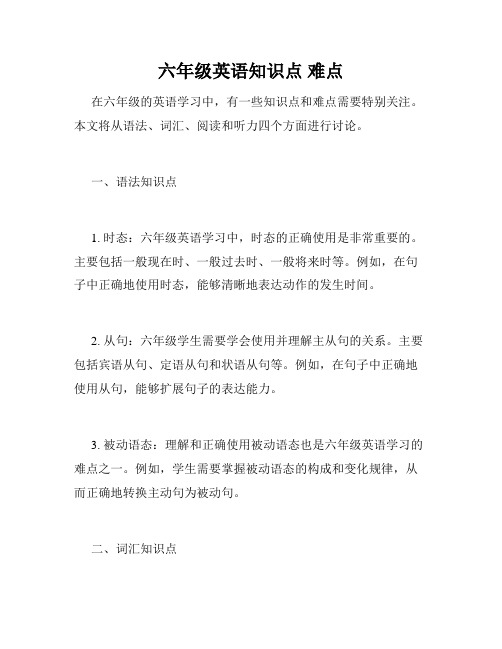
六年级英语知识点难点在六年级的英语学习中,有一些知识点和难点需要特别关注。
本文将从语法、词汇、阅读和听力四个方面进行讨论。
一、语法知识点1. 时态:六年级英语学习中,时态的正确使用是非常重要的。
主要包括一般现在时、一般过去时、一般将来时等。
例如,在句子中正确地使用时态,能够清晰地表达动作的发生时间。
2. 从句:六年级学生需要学会使用并理解主从句的关系。
主要包括宾语从句、定语从句和状语从句等。
例如,在句子中正确地使用从句,能够扩展句子的表达能力。
3. 被动语态:理解和正确使用被动语态也是六年级英语学习的难点之一。
例如,学生需要掌握被动语态的构成和变化规律,从而正确地转换主动句为被动句。
二、词汇知识点1. 同义词和反义词:六年级英语学习中,学生需要积累并辨别一些同义词和反义词。
例如,理解"big"和"large"的区别,以及"happy"和"sad"的反义关系。
2. 词组和短语:学生需要掌握一些常用的词组和短语,以丰富自己的表达能力。
例如,"take care of"意为"照顾","look forward to"意为"期待"。
3. 同音词和同音异义词:六年级学生需要注意区分一些同音词和同音异义词。
例如,"buy"和"by"是同音词,但意义不同。
三、阅读理解阅读理解是六年级英语学习中的重要环节,有一些难点需要注意。
1. 理解文章主旨:学生需要通过阅读短文,抓住文章的重点,理解作者想要表达的主旨。
2. 掌握推理能力:学生需要通过阅读理解,推理出一些信息,理解文章中隐含的意思。
3. 解答问题:学生需要通过阅读理解,准确回答问题,并找出文中的依据。
四、听力技巧1. 听力材料理解:六年级英语学习中,需要通过听力材料来获取信息。
小学英语新课标的重难点
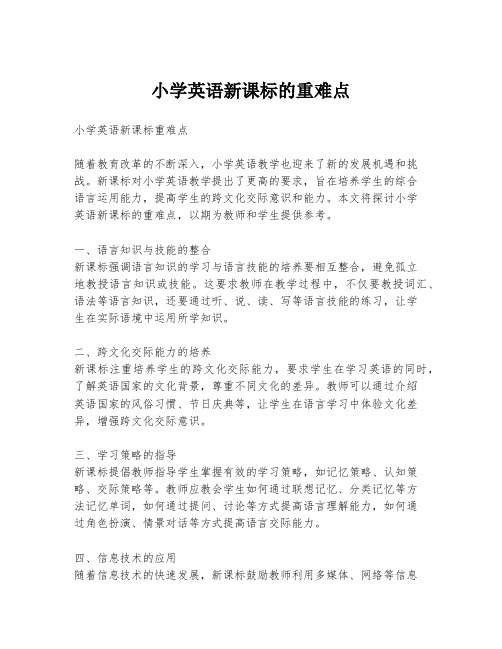
小学英语新课标的重难点小学英语新课标重难点随着教育改革的不断深入,小学英语教学也迎来了新的发展机遇和挑战。
新课标对小学英语教学提出了更高的要求,旨在培养学生的综合语言运用能力,提高学生的跨文化交际意识和能力。
本文将探讨小学英语新课标的重难点,以期为教师和学生提供参考。
一、语言知识与技能的整合新课标强调语言知识的学习与语言技能的培养要相互整合,避免孤立地教授语言知识或技能。
这要求教师在教学过程中,不仅要教授词汇、语法等语言知识,还要通过听、说、读、写等语言技能的练习,让学生在实际语境中运用所学知识。
二、跨文化交际能力的培养新课标注重培养学生的跨文化交际能力,要求学生在学习英语的同时,了解英语国家的文化背景,尊重不同文化的差异。
教师可以通过介绍英语国家的风俗习惯、节日庆典等,让学生在语言学习中体验文化差异,增强跨文化交际意识。
三、学习策略的指导新课标提倡教师指导学生掌握有效的学习策略,如记忆策略、认知策略、交际策略等。
教师应教会学生如何通过联想记忆、分类记忆等方法记忆单词,如何通过提问、讨论等方式提高语言理解能力,如何通过角色扮演、情景对话等方式提高语言交际能力。
四、信息技术的应用随着信息技术的快速发展,新课标鼓励教师利用多媒体、网络等信息技术辅助英语教学。
教师可以利用在线资源、教学软件等,为学生提供丰富多样的学习材料,创造生动有趣的学习情境,提高学生的学习兴趣和学习效率。
五、评价方式的多元化新课标提倡多元化的评价方式,不仅关注学生的语言知识掌握情况,更关注学生的语言运用能力和学习态度。
教师应采用形成性评价和总结性评价相结合的方式,通过课堂表现、作业完成情况、口语表达能力等多方面评价学生的学习效果。
六、教学内容的更新新课标要求教师不断更新教学内容,紧跟时代发展的步伐。
教师应关注国内外英语教学的发展趋势,及时更新教学材料,引入新的教学理念和方法,提高教学的时效性和针对性。
七、学生个体差异的尊重新课标强调尊重学生的个体差异,提倡教师因材施教,满足不同学生的学习需求。
小学英语重难点知识整理

英语重难点知识整理一、根据实际情况回答问题。
(1)以When 引导的句型,回答必须是时间。
节日类:When is Ne w Year’s Day? It’s on January 1st .When is Tree Planting Day? It’s on March 12th.When is May Day?It’s on May 1st.When is Children’s Day?It’s on June 1st.When is Teacher’s D ay? It’s on September 10th.When is China’s National D ay?It’s on October 1st.When is Christmas? It’s on December 25th.When is winter vacation?It’s in January and February.When is summer vacation?It’s in July and August.When is Mother’s Day? It’s in May.When i s Father’s Day? It’s in June.When is Mid-autumn Day?It’s in September or October.When is American Thanksgiving Day?It’s in November.注意:具体到几月几号要用on , 具体到月份要用in. 几号用序数词缩写即可。
生日类:When is your/your mother’s/your father’s birthday?It’s on……具体活动类:When do you get up/eat breakfast/do moring exercises……?I get up/eat breakfast/do moring exercises at 6:30 a.m..或者At 7 o’clock.(具体时间点前要用at ,还有7:00时间表达形式和o’clock 不能连用。
最新版小学三年级英语重点难点

最新版小学三年级英语重点难点英语作为一门世界通用语言,在当前的环境下至关重要。
而对于小学三年级的学生来说,学习英语同样是必不可少的。
因此,掌握小学三年级英语的重点难点是非常重要的。
在本文档中,我们将简单介绍最新版小学三年级英语的重点难点,并为家长和学生提供一些学习英语的建议和技巧。
一、词汇认识和理解英语单词是学习英语的重中之重。
以下是一些小学三年级英语的常见词汇:•Numbers(数字)•Color(颜色)•Family members(家庭成员)•Animals(动物)•Food and Drinks(食物和饮料)学生应该了解这些常见的词汇并通过不断的练习掌握它们。
二、语法语法是学习英语的一个重要方面,小学三年级的学生应该学会以下语法知识点:•介词•数量词•肯定句和否定句•动词的现在时态和过去时态此外,学生应该能够了解名词和动词之间的关系,以及如何正确使用动词。
三、句子构造句子构造是语言学习中最困难的部分之一。
以下是小学三年级英语中常见的句子构造:•简单句•并列句•复合句•疑问句学生应该掌握这些句子的基本结构和常见的用法,并通过不断的练习来提高自己的英语语言技能。
四、阅读技能阅读对于掌握外语非常重要。
以下是小学三年级英语中常见的阅读技能:•词汇理解•阅读理解•判断正误•填空学生应该通过阅读来提高自己的英语水平,并学会正确的用法和解释。
五、口语表达口语表达是学习英语的最终目标之一。
以下是一些小学三年级英语中常用的口语表达:•问候语•日常生活用语•描述自己的习惯和爱好•讨论一些简单的话题学生应该通过模仿和练习来提高自己的口语能力,并积极参与英语课堂和活动。
六、学习建议为了更好地掌握小学三年级英语的重点难点,学生可以尝试以下的方法:•积极参加英语课堂和活动•大量阅读和听英语•认真学习英语语法和句子构造•练习口语表达和编造简单的句子•寻找合适的英语学习资源家长也可以帮助孩子学习英语,例如:•鼓励孩子参加英语课堂和活动•在家中提供英语学习资源•与孩子一起练习口语表达•鼓励孩子积极阅读英语书籍和杂志总之,学好英语需要长期的努力和耐心。
- 1、下载文档前请自行甄别文档内容的完整性,平台不提供额外的编辑、内容补充、找答案等附加服务。
- 2、"仅部分预览"的文档,不可在线预览部分如存在完整性等问题,可反馈申请退款(可完整预览的文档不适用该条件!)。
- 3、如文档侵犯您的权益,请联系客服反馈,我们会尽快为您处理(人工客服工作时间:9:00-18:30)。
小学英语重难点知识大汇总,一、语法易错1. a, an的选择: 元音字母开头的单词用an,辅音字母开头的单词用a.2. am , is , are的选择: 单数用is , 复数用are. I 用 am , you 用 are.3. have , has 的选择: 表示某人有某物.单数用has , 复数用have. I ,you 用 have .4. there is, there are 的选择:表示某地有某物,某人.单数用there is , 复数用there are.5. some, any 的选择:肯定句用some, 疑问句和否定句用any.6. 疑问词的选择:what (什么) who (谁) where (哪里) whose (谁的) why(为什么)when(什么时候)which(哪一个)how old (多大) how many (多少)how much(多少钱)二:形容词比较级当我们需要对事物作出比较时,需要用到比较级.比较级的句子结构通常是:什么 + 动词be (am , is , are ) + 形容词比较级 + than(比)+ 什么 ,如:I'm taller and heavier than you. (我比你更高和更重.) An elephant is bigger than a tiger. (一只大象比一只老虎更大.)形容词的比较级是在形容词的基础上变化而来的,它的变化规则是:①一般的直接在词尾加er ,如 tall - taller , strong - stronger ,②以e结尾的,直接加r ,如 fine – finer ,③以辅音字母加y结尾的,先改y为i再加er,如funny - funnier④双写最后的字母再加er,如big –bigger, thin –thinner ,hot – hotter☆注意☆比较的两者应该是互相对应的可比较的东西.典型错误:My hair is longer than you.(我的头发比你更长.) 比较的两者是我的头发,你(整个人),那么比较的对象就没有可比性.应该改为:My hair is longer than yours. 或My hair is longer than your hair.三:动词过去式动词的过去式的构成规则有:A,规则动词①一般直接在动词的后面加ed:如worked , learned , cleaned , visited②以e结尾的动词直接加d:如 lived , danced , used③以辅音字母加y结尾的动词要改y为i再加ed(此类动词较少)如study –studied carry –carried worry –worried (注意play,stay不是辅音字母加y,所以不属于此类) ④双写最后一个字母(此类动词较少)如 stoppedB,不规则动词(此类词并无规则,须熟记)小学阶段要记住以下动词的原形和过去式:sing – sang , eat – ate , see –saw , have – had , do – did , go - went , take - took , buy - bought , get - got , read - read ,fly - flew , am/is- was ,are - were , say - said , leave - left , swim - swam , tell - told , draw - drew , come - came , lose - lost , find - found , drink - drank , hurt - hurt , feel - felt 四:动词现在分词详解①一般的直接在后面加上ing , 如doing , going , working , singing , eating②以e 结尾的动词,要先去e再加ing ,如having , writing③双写最后一个字母的(此类动词极少)有:running , swimming , sitting , getting五、人称代词主格及宾格人称代词分为主格和宾格,主格和宾格区别:主格和宾格汉语意思相同,但位置不同。
Eg:I(主格)"我"-- me (宾格)"我"主格在陈述句中通常放句首,宾格通常放在动词后或介词后,也就是说宾格,不放在句首。
Eg :I have a new car.( I 主格)Excuse me (me 宾格)I ask him to go (him 宾格)They sit in front of me (me 宾格)主格(8个):I 我you你 he他 she她 it它 we 我们you 你们they他(她、它)们宾格(8个):me我 you你 him 他her她 it它 us我们 you你们 them他(她、它)们六:句型专项归类1.肯定句:是指用肯定的语气来陈述的句子,如:I'm a student.She is a doctor.He works in a hospital.There are four fans in our classroom.2,否定句:含有否定词或表示否定意义词的句子,如:I'm not a student.He does not (doesn't) work in a hospital.There are not (aren't) four fans in our classroom.☆注意☆小结:否定句主要是在肯定句的基础上加上了否定词 "not".有动词be的句子则"not"加在be后面,可缩写成"isn't,aren't",但am not 一般都分开写.没有动词be的句子则要先在主要动词的前面加上一个助动词(do,does,did),然后在它后面加上"not",你也可以把它们缩写在一起如"don't , doesn't , didn't ).这三个助动词要根据人称和时态来选择,其中"does"只用于一般现在时主语是第三人称单数的情况,而"did"只用于一般过去时,不论主语是什么人称和数,都用"did" .3,一般疑问句:是指询问事实的句子,此类句子必须用"yes",或"no"来回答.如:Are you a student ?Yes, I am No, I'm not.Is she a doctor? Yes, she is. No, she isn't.Does he work in a hospital ?Yes, he does. / No, he doesn't. Did you watch TV yesterday evening? Yes, I did. / No, I didn't.☆注意☆小结:一般疑问句是在肯定句的基础上,①把动词be调到首位,其他照写,末尾标点符号变成问号即可.②没有动词be的句子则要在句首加上一个助动词(do,does,did)再把紧跟在后面的动词变回原形,末尾标点符号变成问号即可. 这三个助动词也要根据人称和时态来选择,其中"does"只用于一般现在时主语是第三人称单数的情况,而"did"只用于一般过去时,不论主语是什么人称和数,都用"did" .一般疑问句有个重要的原则就是问和答要一致,即问句里的第一个单词(助动词)和简略答句里的这个词是一致的.4,特殊疑问句:以特殊疑问词(what , where , who , which , when , whose , why , how等)开头引导的句子.此类句子应该问什么就答什么,不能用"yes ,no"来回答.如:What is this?Where are you going?Who played football with you yesterday afternoon?When do you usually get up?Why do you like spring best ?How are you?☆注意☆小结:其中how又可以和其他一些形容词连用组成特殊疑问词组用来提问,如: how many(多少(数量)), how much(多少(钱)), how tall(多高), how long(多长), how big(多大), how heavy(多重)例句:How many pencils do you have ?How many girls can you see ?how many 用来提问可数名词的数量,主要有以上三种搭配, How many + 名词复数 + do you have 你有多少……How many + 名词复数 + can you see 你能看见多少……How many + 名词复数 + are there…有多少……七:完全,缩略形式1、简缩形式的变法:把倒数第二个字母,通常是元音字母变成' 但are除外,are要把a打成' 。
Eg:he is=he's theyare=they're2、简缩形式和完全形式的汉语意思相同。
3、把完全形式变成简缩形式时,一定要注意第一个字母的大小变化。
Eg:What is =What's4、记住一个特殊变化;let's =let us 让我们(不要把' 变成i)5、记住:this is 没有简缩形式this's(错误)6.常见的缩略形式:I'm=I am he's=he is she's=she isthey're=they are you're=you arethere's=there is they're=they arecan't=can not don't=do notdoesn't=does not isn't=is not aren't=are not let's=let uswon't=will not I'll=I will wasn't=was not阅读理解1、My name is Jim. My favorite day is October l8th, becauseit's my birthday. I am very happy on that day. I eat eggsfor breakfast. Then my friends come to my home and playwith me. We sing and dance. Someone plays the piano andsomeone plays the guitar. Lunch is very nice. After lunch, my parents take me to see a movie. My favorite movies are comedies and action movies. After supper, my parents, my sister and I watch TV. Then I go to bed at ten thirty. I don't do my homework on that day. I am very tired but happy on my birthday.( ) 1. Jim's birthday is .A. October 8B. October 18C. December 8thD. December 18th( ) 2. Jim's favorite movies are .A. comediesB. action moviesC. thrillersD. A and B( ) 3. Jim goes to bed at .A. 10:30B. 10:13C. 10:00D. 3:10( ) 4. Does Jim do his homework on his birthday?A. Yes, he does.B. No, he doesn't.C. No, he isn't.D. I don't know.( ) 5. How is Jim on his birthday?A. Tired.B. Happy but not tired.C. Tired but happy.D. Happy.2、My name is Lily. This is my house. There are five rooms in my house. This is my father and mother’s room. There are three pictures on the wall. There is a desk near the window. There are two chairs behind the desk. On the left of the room, there is a toi let. On the right, it’s my room. There are four pictures and a poster on the wall.( )1. This is Lily’s house.( )2. There are four rooms in the house.( )3. There are three pictures in Lily’s room.( )4. There are two chairs and a desk in father and mother’s room.( )5. The toilet is on the left of my father and mother’s room.3、Betty and KittyBetty and Kitty are twins. They’re 12 years old. They look the same. But they have different hobbies. Betty likes collecting stamps. She has many beautiful stamps. They’re from different cities and countries. But Kitty likes growing flowers. The flowers are all very beautiful.Betty and Kitty both like reading books. Betty likes reading storybooks. But Kitty likes reading science books.On Sunday, they usually ride bikes to the park. They can play with their friends there. Sometimes their parents go there, too.根据短文内容,判断下列句子的正误,正确的写“T”,错误的写“F”.( ) 1. Betty is Kitty’s sister.( ) 2. Betty likes growing flowers.( ) 3. Kitty likes reading storybooks.( ) 4. They’re twelve years old.( ) 5. They usually take a bus to the park on Saturday.4、 Lovely pandasPandas’ faces look like cats’, but their fat bodies and short tails are like bears’. Pandas are very lovely and they are friendly to people. People likes them very much.Most Pandas live in China. The northwestern part of Sichuan Province(省) and southern part of Gansu Province are their hometowns. Pandas like to climb trees. They usually live in the forests of high mountains, eat bamboo and drink spring water.根据短文的意思,选出正确的答案.( )1. The panda mainly lives in .A. AmericaB. ShanghaiC. LondonD. China( )2. is like a cat’s.A. The pandaB. The panda’s faceC. The panda’s bodyD. The panda’s tail( )3. Where are the pandas’ hometowns?A. Guangdong and Gansu.B. Sichuan and Suzhou.C. Gansu and SichuanD. Hubei and Sichuan( )4. Wha t’s the panda’s main food?A. Rice.B. Meat.C. Bamboo.D. Grass.5、 My name is Tom. My birthday is June 2nd. The weather is sunny and hot. It’s my favourite season. On my birthday, I usually have a birthday party.Sometimes we have a picnic. Tomorrow is my birthday. I am cleaning the room now. My mom is making a birthday cake for me.( )1.Tom’s birthday is on Children’s Day.( )2.It’s warm and sunny in summer.( )3. Today is June 1st.( )4. Tom’s mother can make a birthday cake.( )ually there is a birthday party on Tom’s birthday.6、“Early to bed, early to rise(起身)makes people healthy, wealthy and wise(健康,富有,聪明).” This is an old English saying. Children should have ten hours’ sleep every night, or they can’t do their work very well. They will not be wise. The body needs exercise. Walking, running, swimming and playing ball games are all exercise. Exercise keeps the body strong.( ) 1. “Early to rise” means that we must early.A. go to schoolB. get upC. go home( ) 2. Children should have hours’ sleep every night.A. 8B. 9C. 10( ) 3. Everybody exercise.A. needB. needsC. wants( ) 4. is good exercise, too.A. JogB. JoggingC. Jogged( ) 5. Exercise makes us .A. fatB. strongerC. thinner7、A train stops at a station(车站). A young man wants to come out, but it is raining. A boy is standing under a big umbrella. The young man says to the boy. "Can you go and get us two hambugers, one for you and one for me? Here are two dollars." "Great!" say the boy and he goesto buy hamburgers. After some time, the boy is back. He is eating a hamburger. "Where is my hamburger?" asks the young man. "Oh, there is only one hamburger left. So I'm eating mine. Here is your dollar. "1.Where is the young man ?A At a stationB Under a big umbrellaC On the train2. What does the young man want to buy ?A UmbrellaB HamburgersC Dollars3. Who helps the young man ?A A boyB A manC .Nobody4. Does the young man get a hambuger ?A No ,he doesn'tB Yes ,he doesC .No ,he does5. Is the boy clever(聪明的) ?A Yes ,he isn'tB Yes ,he isC .No ,I'm not8、There are three people in my family,My father is a worker ,he often plays basketball with me,He hopes me to be "YAO MING".My mom is a teacher,she often does housework ,I often help her.I am very happy with my mom and my father.So,that's my happy family1.What does my father do ?A . A teacherB A workerC . A Student2. What does my father like playing ?A basketballB houseworkC piano3. Who does my father hope me to be ?A HeB Yao MingC Liu Xiang4. Is my mother a teacher ?A Yes ,I amB Yes ,she isC Yes ,he is5. Who helps my mother do housework ?A My fatherB Yao MingC .I。
